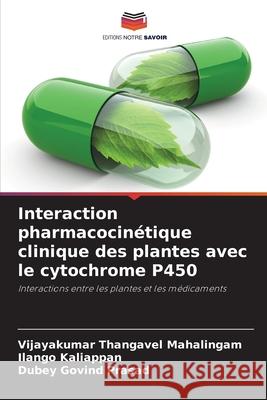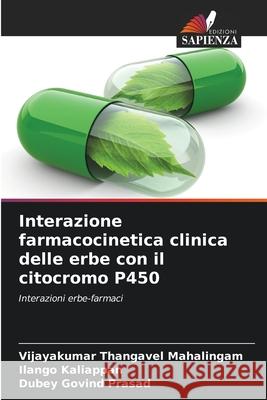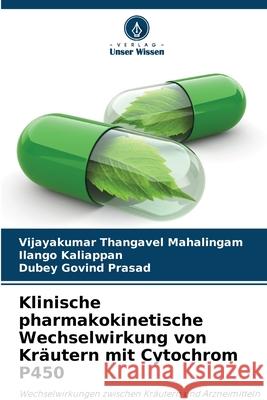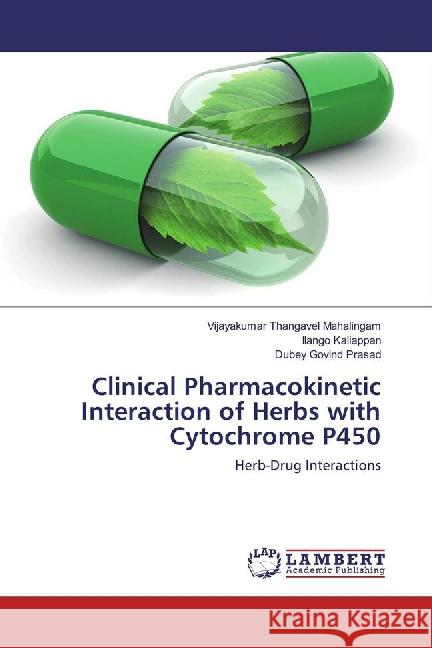topmenu
Wyniki wyszukiwania:
wyszukanych pozycji: 6
 |
Interaction pharmacocinétique clinique des plantes avec le cytochrome P450
ISBN: 9786203889710 / Francuski / Miękka / 2025 / 128 str. Termin realizacji zamówienia: ok. 10-14 dni roboczych. Les médicaments à base de plantes sont largement acceptés comme agents thérapeutiques pour les diabétiques, les arthritiques, les maladies du foie, les remèdes contre la toux et les stimulants de la mémoire. Les patients prennent souvent des produits à base de plantes en association avec des médicaments thérapeutiques et la plupart d'entre eux n'informent pas les médecins de l'utilisation de suppléments à base de plantes. Lorsque des thérapies à base de plantes médicinales sont administrées en même temps que des médicaments prescrits, le risque d'échec du traitement...
Les médicaments à base de plantes sont largement acceptés comme agents thérapeutiques pour les diabétiques, les arthritiques, les maladies du foi...
|
cena:
327,65 |
 |
Interação Farmacocinética Clínica de Ervas com o Citocromo P450
ISBN: 9786203889758 / Portugalski / Miękka / 2025 / 124 str. Termin realizacji zamówienia: ok. 10-14 dni roboczych. |
cena:
327,65 |
 |
Interazione farmacocinetica clinica delle erbe con il citocromo P450
ISBN: 9786203889741 / Włoski / Miękka / 2025 / 124 str. Termin realizacji zamówienia: ok. 10-14 dni roboczych. |
cena:
327,65 |
 |
Kliniczne interakcje farmakokinetyczne ziól z cytochromem P450
ISBN: 9786203889697 / Polski / Miękka / 2025 / 124 str. Termin realizacji zamówienia: ok. 10-14 dni roboczych. |
cena:
327,65 |
 |
Klinische pharmakokinetische Wechselwirkung von Kräutern mit Cytochrom P450
ISBN: 9786203889703 / Niemiecki / Miękka / 2025 / 128 str. Termin realizacji zamówienia: ok. 10-14 dni roboczych. Pflanzliche Arzneimittel sind als Therapeutika für Diabetiker, Arthritis, Lebererkrankungen, Hustenmittel und zur Verbesserung des Gedächtnisses inzwischen weithin akzeptiert. Die Patienten nehmen häufig pflanzliche Produkte in Kombination mit therapeutischen Arzneimitteln ein, und die meisten von ihnen informieren ihre Ärzte nicht über die Verwendung von pflanzlichen Ergänzungsmitteln. Wenn pflanzliche Arzneimittel zusammen mit verschreibungspflichtigen Medikamenten verabreicht werden, steigt das Risiko eines klinischen Behandlungsversagens und unerwünschter Toxizität aufgrund von...
Pflanzliche Arzneimittel sind als Therapeutika für Diabetiker, Arthritis, Lebererkrankungen, Hustenmittel und zur Verbesserung des Gedächtnisses inz...
|
cena:
327,65 |
 |
Clinical Pharmacokinetic Interaction of Herbs with Cytochrome P450 : Herb-Drug Interactions
ISBN: 9783659884672 / Angielski / Miękka / 2016 / 176 str. Termin realizacji zamówienia: ok. 10-14 dni roboczych. |
cena:
327,65 |










